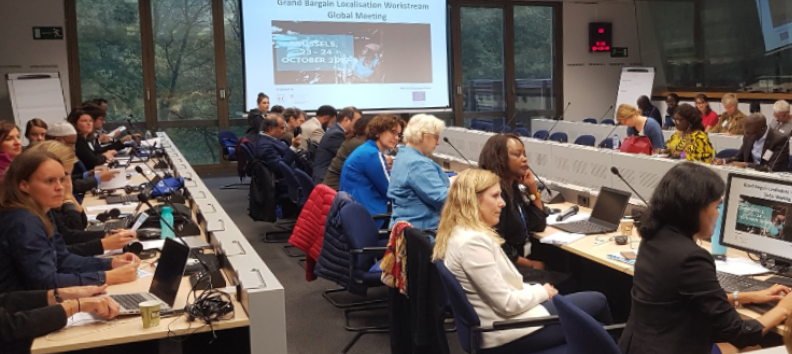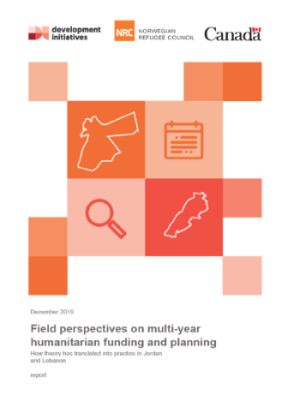The Grand Bargain Bimonthly updates - January 2020
For a better experience, open the newsletter here.
Dear readers,
We hope you had a good start of the new year. It will be an important one for the Grand Bargain, as we reflect on the efforts we undertook to implement the action points from the Annual Meeting 2019. It will also be the year when we move into a higher gear and prepare for 2021, which will mark five years since the Grand Bargain was launched, a milestone that will tell how successeful we have been in making humanitarian aid more effective and efficient for the people in need.
We are pleased to see so many initiatives you have been working on to move forward with your commitments, both at the workstream and individual Signatory level. Seeing many examples of the Grand Bargain implementation in practice, which we included below, makes us optimistic that in 2021 we'll be able to showcase our collective success stories.
We would like to take this opportunity to remind you that the deadline for the submission of self-reports is Friday, 14 February 2020, and you will have an opportunity to ask any questions in relation to it at the webinar on Thursday, 30 January 2020.
Happy reading and best regards,
The Grand Bargain Secretariat
Latest from the workstreams
For further information or to reach out to the workstream Co-convenors, please contact the Grand Bargain Secretariat at gbsecretariat@un.org.
 Global meeting on localization (October 2019, Brussels):
Global meeting on localization (October 2019, Brussels):
Recommendations for moving forward with the localization agenda
The outcome report from the Global Meeting of the localization workstream held on 23-25 October 2019 in Brussels is now available. The report provides a snapshot of the workstream’s progress and learnings as well as outstanding issues, priority actions, and opportunities. Some ideas and considerations to shape the work of the workstream in the next 18 months are also included. The Global Meeting served as concluding event to the series of Regional Conferences held last summer (July and August 2019) - the summary is also available below. practices on quality funding.
Click here to read the outcome report
Workstream 9 (Harmonize and simplify reporting requirements)
Workstream 7 & 8 (Increase collaborative humanitarian multi-year planning and funding and reduce the earmarking of donor contribution)
Field perspectives on multi-year humanitarian funding and planning: How theory has translated into practice in Jordan and Lebanon
The study, conceived as a multi-stakeholder contribution to the Grand Bargain workstream 7&8, provides significant evidence to support the claim that NGOs can do more with predictable and flexible funding and identifies a number of straight-forward recommendations for NGOs, UN agencies and donor partners to implement. Jordan and Lebanon were selected as two sample contexts, given their protracted and relatively stable crisis contexts with a degree of comparability. >> Click here for the study & webinar presentation.
Workstream 6 (Participation revolution)
Reinforcing Change, Empowering Champions
Workstream 6 Co-conveners have finalized a 2019-2020 workplan in consultation with key workstream members and outside experts. The workplan is organized under four pillars of work: 1) Support permanent and sustainable change in the way we do business; 2) Promote the link between effective participation and quality humanitarian response; 3) Ensure inclusion of Participation in annual Grand Bargain reporting; and 4) Better align our work with other Grand Bargain Workstreams. In the coming year, WS6 will continue to cooperate closely with IASC Results Group 2 on Accountability and Inclusion (RG2). We’ve agreed to seek complementary approaches to advancing Participation between GB workstream 6 and IASC Results Group 2 with, broadly speaking, WS6 prioritizing agency-level actions and RG2 leading on collective-level change. >> Click here to read the full update.
Workstream 5 (Improving joint and impartial needs assessments)
Advancing needs assessment and analysis, and taking it to the field
In an effort to enhance confidence in the quality of humanitarian needs assessments, with the assistance of an external consultant, the workstream developed in late 2018 and early 2019 a set of criteria against which to assess the quality of multisectoral needs assessments. Similar criteria were also developed for Humanitarian Needs Overviews (HNOs) which are being revised to reflect the enhancements made to the 2020 Humanitarian Programme Cycle. These will be applied this year by a multi-agency body, inclusive of UN Agencies and donors, who will review and score the 2020 HNOs. Furthermore, field application of the tools and guidance developed was initiated through the 2020 enhanced HPC, which included revisions to guidance, templates and approaches to strengthen linkages between situation, multi-sectoral needs and response monitoring. >> Click here to read the full update.
Workstream 4 (Reduce duplication and management costs with periodic functional reviews)
Webinar summary note: What is the UN Business Innovations Group (BIG) in the Grand Bargain to reduce management cost?
UNHCR hosted and organized the webinar ‘What is the UN Business Innovations Group (BIG) in the Grand Bargain to reduce management cost?’ to present the group and its contribution towards the commitment to “reduce duplication of managements and other costs through maximizing efficiencies in procurement and logistics for commonly required goods and services”. >> Click here to read the full summary.
Latest from the Facilitation Group
Coming up
The Facilitation Group (FG) kickstarted the year by following up on our promise to strengthen collective accountability. We conducted a light follow-up exercise on the action points that were committed by the Signatories and Co-convenors at the Annual Meeting 2019. This will allow us to analyse the remaining gaps that need to be addressed ahead of the Annual Meeting 2020.
As the deadline for submission of self-reports is approaching fast (14 February 2020), we are providing an additional opportunity for you to address any questions to us or the consultant conducting the Annual Independent Report at the webinar on 30 January 2020 at 15.00 (Geneva time).
We are also pleased to announce that we are currently looking at the dates for an annual workshop between the FG and workstream Co-convenors, likely in May 2020. We will communicate the date shortly. Signatory inputs will be included through constituency meetings. The workshop will be an opportunity for a frank exchange on progress achieved and remaining challenges ahead of the Annual Meeting with the Signatories.
Last but not least, beginning of February 2020, WFP will take over from ICRC as FG Chair for the next two months.
Recap of recent activities
The IASC Principals meeting on 5 December 2019 in Geneva included a session on the Grand Bargain, facilitated by the Eminent Person Ms Sigrid Kaag. ICRC on behalf of the FG shared the three main priorities for the upcoming year, already outlined in the letter to the Signatories. A record of the meeting is available here.
A week later, the FG was represented by WFP at the Global Consultation on promoting gender equality and transformative action through the Grand Bargain on 13 December 2019 in Geneva. On gender, as on many other issues, the Grand Bargain is the only mechanism bringing together donors, the UN, Red Cross/Red Crescent movement, and international and national NGOs to strategize and coordinate efforts on this key theme. The FG representative welcomed the important work done by the Friends of Gender, which has been key in having a clear focus and a coordination of efforts to use the Grand Bargain to deliver on long-standing promises to advance gender equality and women’s empowerment.
Should you have any questions or suggestions in relation to the work of FG, don’t hesitate to contact the Secretariat.
Latest from the Signatories
ActionAid: Leading the way: Women-led localization in Central Sulawesi: Towards gender transformative action
Dan Church Aid: Moving the localization agenda forward: Recommendations following the annual meeting of the Charter for Change
FAO: Participation revolution in practice
NRC: Quality funding and harmonization of financial reporting
UNHCR and WFP: Update on use of innovation and technology
UNICEF: Localization - Key to better protecting children in emergencies
WFP: Enhancing Quality Funding Reflection Paper
As committed at the Grand Bargain Annual Meeting on 27 June 2019, WFP is pleased to share their management insights on quality funding. While their reflections and benchmarks are agency specific, they indicate a pathway that other agencies could consider recognising that the current impasse between donor and agency Grand Bargain Signatories needs a more nuanced understanding of the realities, barriers and opportunities to improve the funding of the humanitarian system. >> Click here to read the full paper.

"The Grand Bargain has to be seen as a long-term endeavor. Changes foreseen are very significant and require a lot of effort. We have to keep recognizing that those changes will take time – changes in transparency, administration, financial and accounting systems. It is difficult to assess the progress on an annual basis. A 5-year retrospective review in 2021 will probably give a better idea of where the progress has been made.”
Author: Victoria Metcalfe-Hough, Research Associate, Humanitarian Policy Group, Overseas Development Institute, at the Global Consultation on Gender and the Grand Bargain, 13 December 2019
The Grand Bargain in Practice
 Dutch Relief Alliance boosts support for local and national responders: Striving to implement their Grand Bargain commitment to provide more support and funding tools for local and national responders, the Dutch Relief Alliance members assisted local organizations in directly accessing funding for their programmes, and strengthening capacity in DR Congo, Iraq, Nigeria, Somalia and Sudan. >> Click here to read how.
Dutch Relief Alliance boosts support for local and national responders: Striving to implement their Grand Bargain commitment to provide more support and funding tools for local and national responders, the Dutch Relief Alliance members assisted local organizations in directly accessing funding for their programmes, and strengthening capacity in DR Congo, Iraq, Nigeria, Somalia and Sudan. >> Click here to read how.
Photo: Moayed Al Shaibani/Oxfam
Examples of implementation in a visual map: These are a few examples of implementation of the Grand Bargain commitments by the Signatories at country level in 2018. The examples have been extracted from the Grand Bargain Annual Independent Report 2019 and are not exhaustive. They have been reported by the Signatories as their contributions to the Grand Bargain efforts. >> Click here to see the 1-pager.
Do you have examples of how your organisation rolled-out the Grand Bargain commitments at regional and country level? Share them with us here!

